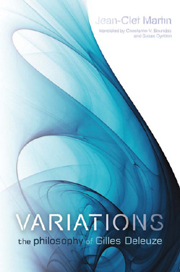Book contents
- Frontmatter
- Contents
- Letter-Preface by Gilles Deleuze
- Preambles
- First Variation: Ethics and Aesthetics
- Second Variation: Three Poetic Formulas for Nomadic Distribution
- Third Variation: Multiplicities
- 1 The Image of Thought
- 2 Variations
- 3 Poetics of Multiplicities
- Fourth Variation: Malcolm Lowry, or, the Manifesto of Things
- Postscript to the Anglo-American Edition: What is a Multiplicity?
- Notes
- Bibliography
- Index
3 - Poetics of Multiplicities
from Third Variation: Multiplicities
Published online by Cambridge University Press: 12 September 2012
- Frontmatter
- Contents
- Letter-Preface by Gilles Deleuze
- Preambles
- First Variation: Ethics and Aesthetics
- Second Variation: Three Poetic Formulas for Nomadic Distribution
- Third Variation: Multiplicities
- 1 The Image of Thought
- 2 Variations
- 3 Poetics of Multiplicities
- Fourth Variation: Malcolm Lowry, or, the Manifesto of Things
- Postscript to the Anglo-American Edition: What is a Multiplicity?
- Notes
- Bibliography
- Index
Summary
Deforming figures and forms, positioning the body for a leap in the same place, and preparing it to be ramified in a depth of dimensions of variable superimposed curvatures is a singular operation, entirely extended towards a horizon of visibility with unstable contours. Philosophy cannot be separated from the madness of sight, from the decomposition of all forms carried off by a modulable lens – an optical lens where shadows are lengthened and co-imbricated, refined and entangled as if riding an infernal carousel. For Deleuze, philosophy is a method of vital rectification, an anamorphosis imposed only after a torsion places the curvature into variation from which blocks of space-time are being removed (Deleuze 1988b: 13). The philosopher, therefore, is a member of the race of clairvoyants – with steely eyes, and a diagrammatic and discerning ear placed at the service of hearing the imperceptible. He mobilises a new articulation of faculties in perpetual heterogeneity and a discordant accord by means of which an eye hears where a thought touches its concepts with the eyes of the mind. These are incandescent eyes, charged with sensibility and tact that seize the world bodily, decomposing and recomposing it along a depth that Deleuze defines as a body. This is smooth and shiny body without organs, a body on which things are lit up, touched, and thought, with eyes and ears whose percepts can be translated and transposed through anamorphosis or topological transformation.
- Type
- Chapter
- Information
- VariationsThe Philosophy of Gilles Deleuze, pp. 162 - 174Publisher: Edinburgh University PressPrint publication year: 2010



